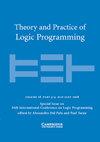sm ProbLog: ProbLog中用于概率论证的稳定模型语义
IF 1.1
2区 数学
Q3 COMPUTER SCIENCE, SOFTWARE ENGINEERING
引用次数: 2
摘要
摘要论证问题涉及从一组论证的关系结构中确定它们的可接受性。当可用信息不确定时,概率论证框架提供建模工具来解释它。本文的第一个贡献是将概率论证框架解释为概率逻辑程序。概率逻辑程序是用概率标注某些事实的逻辑程序。我们表明,表示概率论证框架的程序不满足概率逻辑规划(PLP)语义中的一个常见假设,即概率事实完全捕获了所研究领域的不确定性。本文的第二个贡献是一个新颖的PLP语义,其中概率事实的选择并不唯一地决定逻辑原子的真值分配。本文的第三个贡献是实现了一个支持这种语义的PLP系统:sm ProbLog。sm ProbLog是一种基于PLP语言ProbLog的新型PLP框架。sm ProbLog支持PLP的许多推理和学习任务,这与我们的第一个贡献一起,为概率论证提供了新的推理工具。我们通过实验来评估我们的方法,分析所提出算法的计算成本及其在论证问题数据集上的应用。本文章由计算机程序翻译,如有差异,请以英文原文为准。
Abstract Argumentation problems are concerned with determining the acceptability of a set of arguments from their relational structure. When the available information is uncertain, probabilistic argumentation frameworks provide modeling tools to account for it. The first contribution of this paper is a novel interpretation of probabilistic argumentation frameworks as probabilistic logic programs. Probabilistic logic programs are logic programs in which some of the facts are annotated with probabilities. We show that the programs representing probabilistic argumentation frameworks do not satisfy a common assumption in probabilistic logic programming (PLP) semantics, which is, that probabilistic facts fully capture the uncertainty in the domain under investigation. The second contribution of this paper is then a novel PLP semantics for programs where a choice of probabilistic facts does not uniquely determine the truth assignment of the logical atoms. The third contribution of this paper is the implementation of a PLP system supporting this semantics: sm ProbLog. sm ProbLog is a novel PLP framework based on the PLP language ProbLog. sm ProbLog supports many inference and learning tasks typical of PLP, which, together with our first contribution, provide novel reasoning tools for probabilistic argumentation. We evaluate our approach with experiments analyzing the computational cost of the proposed algorithms and their application to a dataset of argumentation problems.
求助全文
通过发布文献求助,成功后即可免费获取论文全文。
去求助
来源期刊

Theory and Practice of Logic Programming
工程技术-计算机:理论方法
CiteScore
4.50
自引率
21.40%
发文量
40
审稿时长
>12 weeks
期刊介绍:
Theory and Practice of Logic Programming emphasises both the theory and practice of logic programming. Logic programming applies to all areas of artificial intelligence and computer science and is fundamental to them. Among the topics covered are AI applications that use logic programming, logic programming methodologies, specification, analysis and verification of systems, inductive logic programming, multi-relational data mining, natural language processing, knowledge representation, non-monotonic reasoning, semantic web reasoning, databases, implementations and architectures and constraint logic programming.
 求助内容:
求助内容: 应助结果提醒方式:
应助结果提醒方式:


